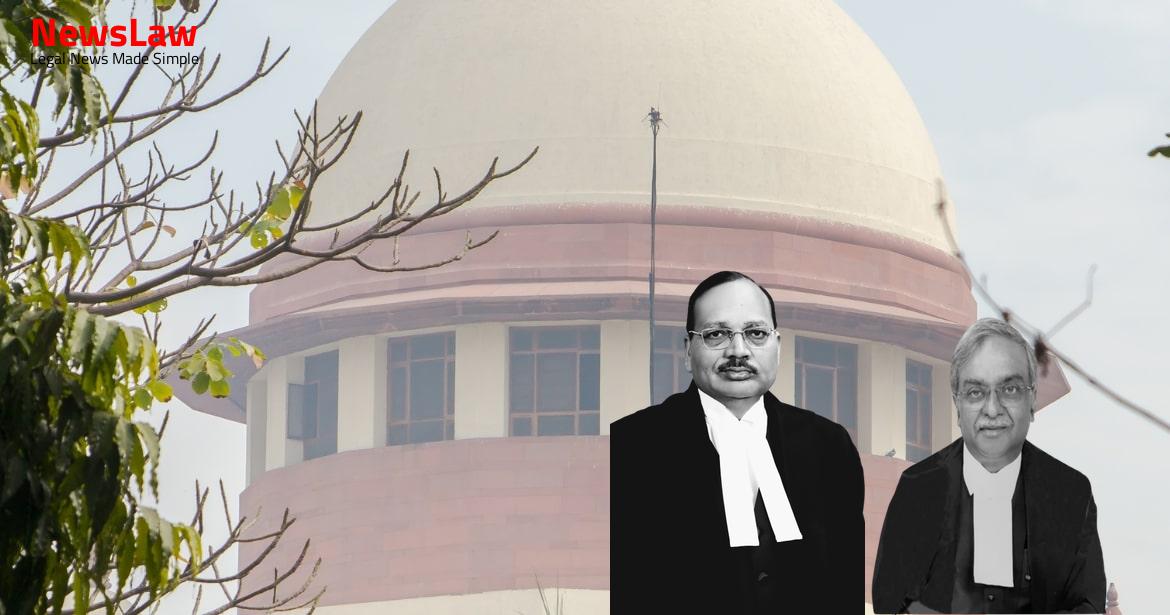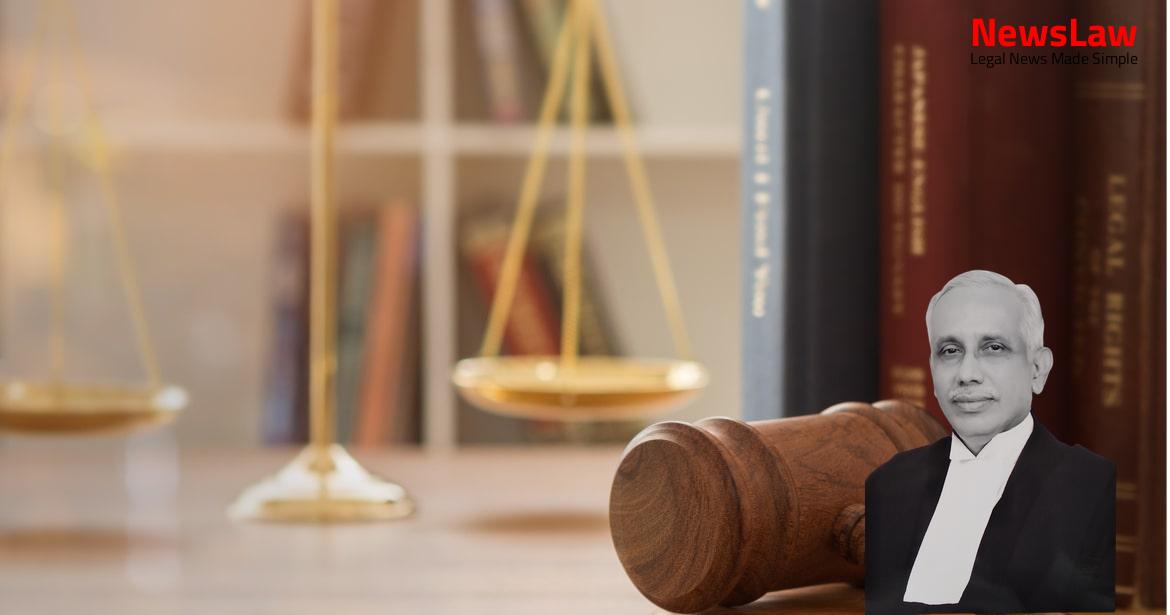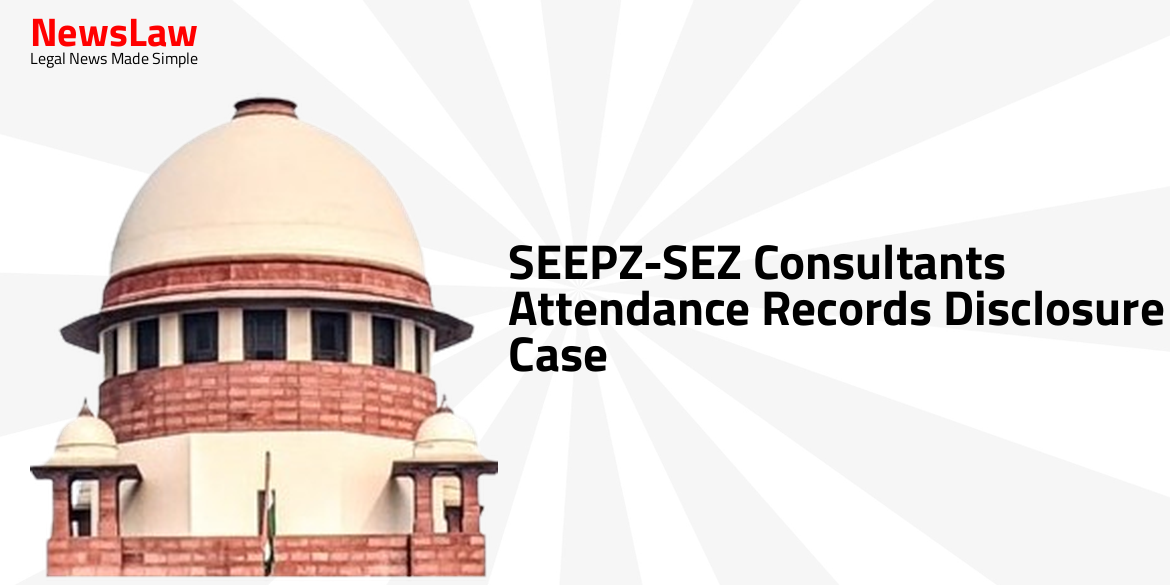The court’s legal analysis of the Entry Fee refund claim delves deeply into various legal doctrines and precedents. The complexity of the issue is unravelled through a thorough examination of frustration, restitution, contractual obligations, and the validity of the Entry Fee payment. The court scrutinizes the implications of previous judgments, the legality of set off policies, and the conduct of the parties involved. Stay tuned to understand the intricate legal perspectives in this significant case.
Facts
- The appellant moved a Miscellaneous Application in Civil Appeal No 1447-1467 of 2016 seeking permission for the revival of earlier civil appeals, which had been permitted to be withdrawn on 13 May 2016.
- The appellant paid the circle wise Entry Fee of Rs 1.1 crores and furnished a Performance Bank Guarantee and Financial Bank Guarantee for the twenty-one areas.
- The appellant entered into UASL agreements on 3 March 2008 for the twenty-one service areas with the respondent, which came into effect from 25 January 2008.
- The judgment of this Court in Centre for Public Interest Litigation declared the policy of the Union government for allocation of 2G spectrum on a ―First Come First Serve‖ basis as illegal, leading to the quashing of the appellant’s licenses.
- The appellant claims entitlement to the refund of its Entry Fee based on civil, contractual, and constitutional principles.
- The set off policy of the Union government, granting a set off of the Entry Fee to certain entities, is challenged by the appellant on grounds of incorrect classification, lack of intelligible differentia, lack of nexus to its object, manifest arbitrariness, and discrimination.
- The Central Bureau of Investigation filed a petition for leave to appeal against the order of acquittal, pending before the Delhi High Court.
- The set off policy of the Union government is considered an admission of a debt due and payable by certain bidders as per the appellant’s claims.
- The appellant raised the issue of a refund of the Entry Fee before the TDSAT, citing exoneration by the Special Judge, CBI.
- The UASL agreements stipulated conditions governing the duration of the license and the Entry Fee.
- The appellant sought liberty from the Court to withdraw the civil appeals on 13 May 2016 and approach the Court again if necessary.
- The classification based on the decision to participate in the subsequent auction for refund of Entry Fee is discriminatory and lacks nexus with the set off policy.
- Out of the eight Telecom Service Providers (TSPs) whose licenses were quashed, four TSPs participated in the subsequent auction and were allowed a set off of their Entry Fee towards the payment for the auction allotted spectrum.
- Details of TSPs receiving set off and penalty amounts are provided.
- The appellant was not attributed any role in the quashing of its licenses.
- The appellant has been acquitted of criminal charges by the Special Judge, CBI.
- Criminal proceedings do not impede civil proceedings.
- The respondent has already auctioned spectrum earlier allocated to the appellant and benefitted twice from the same spectrum.
- The grant of licenses was found to be ‘stage-managed’ to favor specific licensees including the appellant, and costs were imposed on them.
- Quashing of licenses in the previous judgment did not result in a refund of Entry Fee.
- Appellant has ceased to be a licensee after the judgment quashing UASLs granting.
- The appellant withdrew civil appeals on 13 May 2016 with the option to move this Court again if necessary, limiting their jurisdiction to the Supreme Court only.
- The decision of the EGoM granting set off for bidders who participated and were successful in fresh auctions was a one-time concession to ensure uninterrupted telecom services.
- Entry Fees paid by licensees covered in the previous judgment could not have been refunded.
- The appellant shut down operations on 1 June 2012 after porting out all subscribers.
- The TDSAT dismissed the First Telecom Petition stating that the quashing of licenses did not render the UASL agreements void under Section 65 of the Indian Contract Act 1872.
- TDSAT did not grant the appellant leave to approach the TDSAT after the order dated 13 May 2016.
- The appellant was acquitted of criminal charges in a separate case by the Special Judge, CBI.
- TDSAT did not indicate a remedy for the appellant to approach it after the conclusion of trial before the Special Judge, CBI.
- The appellant’s commercial decision not to participate in the subsequent auction penalized under the set off policy is considered discriminatory.
Also Read: Electoral Malpractices in Mayor Election
Arguments
- The petitioner claims restitution based on the principle that the licenses were quashed due to the policy of the Union government being found illegal and arbitrary.
- The petitioner argues that the payment of Adjusted Gross Revenue is not relevant to their case.
- The petitioner opposes the non-refundable nature of the Entry Fee, stating that the UASL agreements expressly stated it to be a one-time non-refundable fee.
- The petitioner argues that the judgment in CPIL does not expressly or impliedly bar the refund of the Entry Fee, allowing for the claim based on the principle of restitution.
- The petitioner insists that the voidness of the UASLs should relate back to their inception, based on the retrospective nature of judicial decisions unless specified otherwise.
- Appellant relies on TDSAT decision in S Tel Pvt. Ltd. v. Union of India to attribute blame for UASLs quashing solely to Union government.
- Argues that the petition under Article 32 leading to CPIL decision did not seek forfeiture of Entry fee, so constructive res judicata principles do not apply.
Also Read: Balancing Power and Transparency: Electoral Bonds Struck Down, Disclosure Mandated
Analysis
- The analysis section examines the claim of the appellant for a refund of the Entry Fee based on the doctrines of frustration and restitution.
- The TDSAT’s jurisdiction to entertain the claim for a refund of the Entry Fee is discussed extensively.
- The Court delves into the validity of the Entry Fee payment and the contractual obligations surrounding it.
- The implications of the decision in CPIL (supra) on the appellant’s claim for a refund are scrutinized.
- The issue of forum shopping, fairness in litigation tactics, and the conduct of the appellant are addressed.
- The TDSAT’s conclusions on the non-refundability of the Entry Fee and the appellant’s entitlement to a refund are thoroughly examined.
- The appellant’s reliance on the Contract Act and the UASL Guidelines for claiming a refund is analyzed.
- The TDSAT’s stance on the appellant’s claim for restitution and the distinction from previous cases is discussed.
- The Court evaluates the legality of the set off policy adopted by the Union government in the context of the refund claim.
- The Court assesses the appellant’s conduct leading up to the CPIL judgment and how it impacts the refund claim.
- The judgment in CPIL (supra) highlighted the lack of transparency and favoritism under the ‘First Come First Serve’ policy of the Union government.
- The TDSAT’s powers under the TRAI Act were noted to be broad without imposed limitations by the Court.
- The doctrine of frustration was elaborated in the Satyabrata Ghose v. Mugneeram Bangur & Co. case.
- The TDSAT, being a statutory body, had the authority to determine its jurisdiction within statutory constraints.
- The principle of ex turpi causa non oritur actio (no action can arise from a bad cause) was emphasized, with a reference to the Holman v. Johnson case.
- Section 65 of the Indian Contract Act on the principle of restitution was discussed, including the defense of illegality.
- The application of Section 65 for restitution was noted to be limited to cases where the claiming party was not in pari delicto.
- In cases of illegality, restitution claims are not supported if both parties were equally responsible, as mentioned in the Union of India v. AUSPI case.
- Contracts held to be void in CPIL (supra) were to follow the consequences outlined in the Indian Contract Act.
- The Court emphasized not assisting parties in illegality through the ex turpi causa principle.
- The interpretation of Section 14 of the TRAI Act was discussed, indicating a broader jurisdiction for the TDSAT.
- Various cases were cited to explain the application of in pari delicto and restitution principles in different scenarios.
- In the judgment of Vedanta Ltd. v. The Goa Foundation & Ors., Justice D Y Chandrachud expressed disapproval of tactics involving selective reliance on case law to support one’s argument.
- The act of cherry-picking only those cases that support one’s position and disregarding contrary precedents was frowned upon in the mentioned case.
- Justice D Y Chandrachud highlighted the importance of presenting a holistic and balanced view of legal principles, rather than resorting to selective quoting for strategic advantage.
- The criminal trial before the Special Judge, CBI was limited to the question of whether the promoters of the appellant had cheated the DoT by providing a false representation of its compliance with Clause 8 of the UASL Guidelines.
- The Special Judge, CBI acquitted the promoters of the appellant as prosecution failed to prove key elements.
- The acquittal of the promoters of the appellant does not erase the findings in the final judgment of the Supreme Court in CPIL case.
- The appellant cannot be assisted by the Court in obtaining the refund of the Entry Fee as a beneficiary and confederate of fraud.
- Taking action before the TDSAT goes against the judgment of the Supreme Court in CPIL case.
- The conclusion reached is that there is no merit in the appeals.
- Appellant’s attempt to obviate findings by relying on acquittal does not hold.
Also Read: Recall of Resolution Plan Approval: Legal Analysis
Decision
- Appeals dismissed
- Pending applications disposed of
Case Title: LOOP TELECOM AND TRADING LIMITED Vs. UNION OF INDIA (2022 INSC 255)
Case Number: C.A. No.-001447-001467 / 2016



